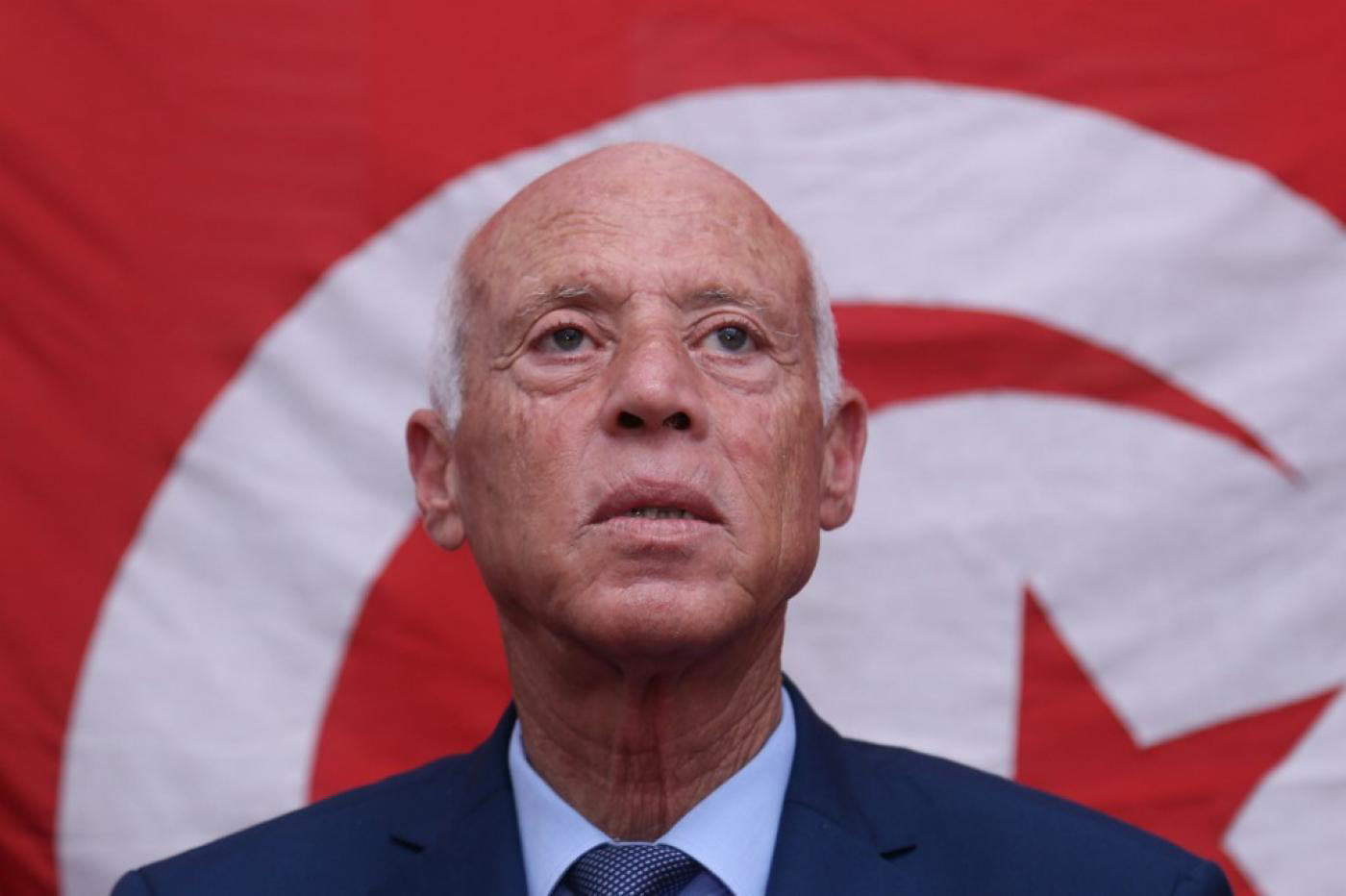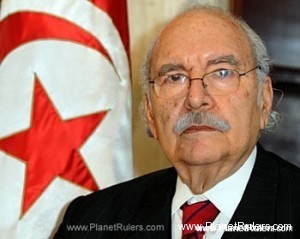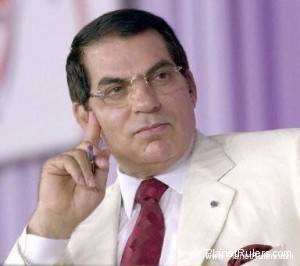Kais Saied, President of Tunisia (since Oct 23, 2019)

Kais Saied is the son of Moncef Saied from Béni Khiar (Cap Bon) and Lalla Zakia, a family of modest but intellectual origin. His paternal uncle Hicham Saied was the first pediatric surgeon in Tunisia, known worldwide for separating Siamese twins in the 1970s.
Saied was sworn in as Tunisia’s president on 23 October 2019. He is the first president born after the country gained independence from France in 1956.
Kais Saied is married to the judge Ichraf Chebil, whom he met when she was a law student in Sousse. They have three children.
Source : https://en.wikipedia.org/wiki/Kais_Saied
Mohamed Ennaceur, Former President of Tunisia (since Jul 25, 2019)

On 4 December 2014, he was elected as President of the Assembly of the Representatives of the People, with 176 yes votes out of 214 present MPs. Upon President Beji Caid Essebsi’s death, Ennaceur ascended as interim president according to the Constitutional provision for presidential succession.
Mohamed Ennaceur is married to Siren Ennaceur (née Mønstre), a Norwegian national from Bergen. They met when they were students in Paris and have been married for over 60 years. They have five children.
Source: https://en.wikipedia.org/wiki/Mohamed_Ennaceur
Béji Caïd Essebsi, Former President of Tunisia (since Dec 31, 2014; died on Jul 25, 2019)

Essebsi is the founder of the Nidaa Tounes political party, which won a plurality in the 2014 parliamentary election. In December 2014, he won the first regular presidential election following the Tunisian Revolution, becoming Tunisia’s first freely elected president.
Born in Sidi Bou Said to a family from the Tunisian landed élite, he is a great-grandson of Ismail Caïd Essebsi, a Sardinian kidnapped by the Tunisian corsairs along the coasts of Sardinia at the beginning of the nineteenth century who became a mamluk leader raised with the ruling family. Later recognized as a free man he became an important member of the government. He has two sons and two daughters.
Source: https://en.wikipedia.org/wiki/Beji_Caid_Essebsi
Fouad Mebazaa, Former Interim President of Tunisia (since on Jan 15, 2011)
Fouad Mebazaa (Arabic: فؤاد المبزع ), born on16 June 1933, has been the Interim President of Tunisia since 15 January 2011. He was active in Neo Destour prior to Tunisian independence, served as Minister of Youth and Sports, Minister of Public Health, and Minister of Culture and Information, and has been President of the Chamber of Deputies of Tunisia since 1997.
Mebazaa studied law and economics in Paris. Born during the French occupation of Tunisia, Mebazaa became a member of the “constitutional youth” in 1947 and was elected a member of the Aix–Marseille unit of the Neo Destour political party, which played a major role in gaining independence from France. He was elected as Secretary-General of the Marsa unit of Neo Destour in 1955 and President of its Montpellier unit in 1956.
After Tunisian independence in 1956, Mebazaa was elected to the Chamber of Deputies several times, starting in 1964. He was Governor-Mayor of Tunis from 1969 to 1973, occupied several ministerial posts relating to youth, sports, public health, culture and information during the 1970’s and late 1980’s, and was an ambassador in Geneva and Morocco during the 1980’s. Mebazaa has been a member the Central Committee of the Constitutional Democratic Rally since 1988. From 1995 to 1998 he was Mayor of Carthage. He was elected President of the Chamber of Deputies in 1997 and reelected in 2004.
After the exile of President Zine El Abidine Ben Ali following continued protests, Mebazaa was appointed as the interim President following the Constitutional Council’s interpretation of the situation and the Constitution. Prime Minister Mohamed Ghannouchi had briefly claimed to be interim President the previous day, prior to the Constitutional Council’s declaration of its opinion. Under Article 57 of the Constitution, an election must take place from 45 to 60 days following Mebazaa’s appointment.
Zine el Abidine Ben Ali, Former President of Tunisia (sacked on Jan 12, 2011)
(1936- ) President of Tunisia since 1987.
Ben Ali took power in a bloodless coup on November 7, when the cranky and old Bourguiba was ousted. Ben Ali was at that time prime minister, and had strong connections in the army, which gave support to the coup. What exactly transpired during the coup is still uncertain. It is clear, however, that the political situation in Tunisia was very unstable, and that Bourguiba was losing control. The situation became far more stable immediately after the coup.Ben Ali has gone through three periods during his presidency. The first, from 1987 to 1990, was marked by a will to compromise. He had several talks with the Islamists, and he brought Islam back to the centre of Tunisian society.
The period from 1990 to 1992 was marked by one of the most efficient police actions in modern Arab history. The Islamists, an-Nahda, were destroyed and their leaders went into exile.
The period from 1992 until the present has been marked by Ben Ali running an internationally neutral politics dominated by a pragmatic attitude, not personal sentiment or religion, and he is thus recognized as one of the most reliable leaders in the third world. This has allowed him to become a mediator between other countries, both Muslim and Western.
Still, the leadership of Ben Ali is strongly criticised. Although control is mainly dealing with Islamists, sometimes even journalists and politically moderate activists have been persecuted and even imprisoned for demanding democracy and freedom of speech.
Economics under Ben Ali have been a roller coaster. Some years the growth has been enormous, then to be followed by stagnation in the following year. Ben Ali’s economic politics are a kind of social democracy, the government trying to control the activities of investors and private companies. This has sometimes killed incentives.
Corruption is still a problem under Ben Ali, even if there has been some reform activity. The economy in Tunisia seems to depend on the government’s ability to control without strangling and not to let nepotism stand in the way of national interests.
The line of Ben Ali’s politics in the years to come will probably not change much, as he is in total control, and Tunisians are quite satisfied. The promises to introduce democracy are pending, and his explanation for this is that neither economy nor people are ready, implying that Islamism would be a major force in an election.
Since 2000 to 2002, a process towards allowing Ben Ali to remain in power for life, seems to have been started. The constitution was amended in 2002, in which the only remaining obstacle to this would be the age limit of 75 years for a president.
Ben Ali is twice married. His present wife, Leila Trabelsi, hairdresser by profession. He has 3 children from the first marriage, Insaf, Dorsaf and Cyrine. With Leila he has 2 daughters and son (Nesserine, Halima, Mohamed).
BIOGRAPHY
1936 September 3: Born in Hammam Susa.
1958: Becomes director of military security.
1974: Is appointed military attaché to Morocco.
1977: Becomes director of national security of the interior ministry, where he follows a hard line towards organizations protesting against the government’s politics.
1979: Becomes general, and is appointed ambassador to Poland.
1984 January: Returns as director of national security.
— October: Ben Ali becomes secretary of state of national security.
1985 October: Becomes minister of national security.
1986 April: Is appointed interior minister.
— May: Is appointed minister of state for internal affairs.
1987 October 2: Becomes prime minister.
— November 7: Coup removes Bourguiba. Ben Ali becomes new president. The coup is staged so that Bourguiba is declared senile, and Ben Ali uses the constitution to have himself appointed president.
1989: Elections. Islamists gain between 14 and 30% of the votes (majority in certain parts of Tunis). Ben Ali gets his infamous 99.27% of the ballots in the presidential elections.
1990: Ben Ali chooses a mediating position on the Iraqi invasion of Kuwait. Condemns both Iraq and the international community for their actions.
1991- 92: Strong actions towards the Islamists. Thousands get arrested, some killed. Arrests still continues
1994: Elections, in which Ben Ali is reelected. This time the reported results show 99.9% in his favour.
1995: Changes in the government, where more economically inclined people fill up the posts.
1999 October 24: Is reelected president, with the alleged support of 99.44% of the votes. This was the first contested presidential election, but the two other candidates represented no serious challenge, and there was no real campaigns held.
2002 May: Changes in the constitution allow a president to stay in power until the age of 75 (70 before) and be reelected unlimited times (3 times before, Ben Ali had at this time been reelected the three times).
2003 June: A French newspaper suggests that Ben Ali is ill with cancer, and that a family power struggle regarding possible successors was resulting from this.
2004 October 24: Ben Ali is reelected president, receiving 94.5% of the votes. Mohamed Bouchiha gets 3.8%, Mohamed Ali Halouani 1%.



